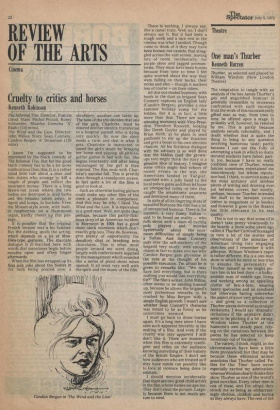Cinema
Cruelty to critics and horses
Kenneth Robinson
The Infernal Trio. Director: Francis Girod. Stars: Michel Piccoli, Romy Schneider, Mascha Gomsha 'X' Rialto (110 mins).
The Wind and the Lion. Director: John Milius. Stars: Sean Connery, Candice Bergen 'A' Dominion (120 mins).
I know I'm supposed to be impressed by the black comedy of The Infernal Trio. But for me good black comedy has to be a lot more rumbustious than this. It is a rather timid little tale about a man and two sisters who arrange to kill a couple of people and collect the insurance money. There is a long drawn-out scene where the two bodies are destroyed in acid baths and the remains taken away, in liquid and lumps, in buckets. Even the Mozart-style score, with builtin raspberries on a Hammond organ, hardly cheers up this passage.
It is possible that the original French version was a lot funnier. But the dubbing spoils the acting, which depends on a lot of MonDieu-type gestures. The staccato dialogue is ill-matched here with words that sometimes begin before mouths open and often linger afterwards.
When the film has wrapped up its first sick joke about the bodies in the bath being poured over a shrubbery, another one turns up. The boss of the trio decides that one of the girls, Charlotte, must be insured and her identity transferred to a hospital patient who is dying very quickly. By now the story needs a twist and that is what it gets. Charlotte is instructed to speed the girl's death by bringing her home and playing all-girls-together games in bed with her. She begins reluctantly and after being encouraged by the girl is then rejected. The film ends with Charlotte's suicidal fall. This is prettily done through a translucent screen. In fact quite a lot of the film is good to look at.
Such an otherwise boring picture could make any other film of the week a pleasure in comparison. And this may be why I liked The Wind and the Lion. It is equivalent to a good read. Well, not quite that perhaps, because this partly-fictitious story of an American incident in Morrocco in 1904 has a good many slack moments which don't exactly grip you. They do, however, give plenty of opportunity for desultory chat or breaking into chocolates. This is what most people around me were doing, largely with confectionery supplied by the management which sounded like a series of pistol shots when opened. It all went very well with the spirit and the music of the film. There is nothing, I always say, like a camel train. Well no, I don't always say it. But it had been a tough week and a nice rest in the cinema was what I needed. Though come to think of it they may have been horses, not camels, that strag gled across the vast screen, leaving lots of room, incidentally, for purple skies and jagged promon tories. They must have been horses because from time to time 1 felt quite worried about the way they were falling on their backs, their necks and also — though it matters less of course — on their riders.
All this out-moded business, with hoofs in the dust as brigand Sean Connery captures an English lady (Candice Bergen), provides a nice summer holiday romp for the kiddies. But it is, in fact, a little more than that. There are some amusing moments with Vice-Presi dent Theodore Roosvelt, looking like Derek Guyler and played by Brian Keith, as he plans to send gunboats to stir up the situation and give a boost to his own election chances. All his fictitious dialogue with his advisers is so well done that the kiddies (and the grownups too) might think the story is a genuine slice of history. I imagine some critics might find echoes of recent events in the way the Americans landed in Tangier, marched with a jolly band to the local palace gates and then let loose an unexpected volley or two that caught the inhabitants unawares and destroyed many of them.
In spite of all its lingering shots of beautiful horizons the film has a lot of unexpected humour. There is, for instance, a very furmy Sultan — said to be based on reality — who falls about with a team of cycling polo players and worries hysterically about the enor mous difficulties of simply being a Sultan. And Sean Connery puts over the self-mockery of the brigand very nicely; with enough charm in fact to make you see why Candice Bergen gets glycerine in the eyes at the thought of his possible execution. I'm afraid he is given to remarks like, "We may have lost everything, but is there nothing you would lose everything for?" The film's writer, John Milius, often seems to be sending himself up, because he allows the brigand's most portentous remarks to be crushed by Miss Bergen with a simple English proverb. I wasn't sure whether Sean Connery's character was meant to be as funny as he sometimes seemed.
I must go back to those horses again. It's a long time since I have seen such apparent brutality in the making of a film. And even if the cruelty was only apparent I still don't like it. There are moments when this film is extremely intelligent and relies on the audience knowing something of their history of the British Empire. I don't see how audiences who are treated as if they have minds can possibly like to look at violence being done to animals.
I should mention incidentally that there are two good child actors in the film whose names escape me. They don't steal the picture. Largely because there is not much picture to steal.


































 Previous page
Previous page